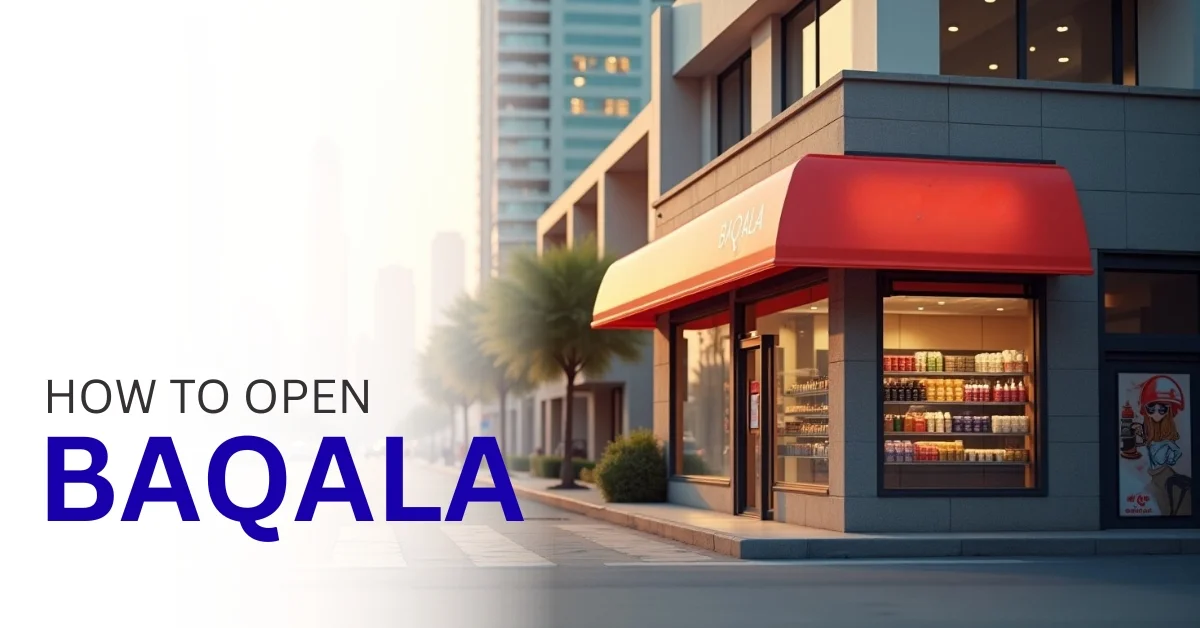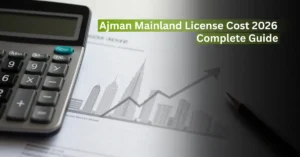Thinking about starting your own business in Abu Dhabi? A baqala, or a local corner store, is a fantastic option. It’s a key part of the community and provides a crucial service to residents. This guide will walk you through everything you need to know, from the initial planning stages to getting your doors open, all in a clear, step-by-step format.
What is a Baqala in Abu Dhabi?
A baqala is more than just a small shop; it’s a neighborhood institution. Understanding its role is the first step to success.
Meaning and Local Importance
In Abu Dhabi, a baqala is a small, local convenience store. It’s the go-to place for everyday essentials, from snacks and drinks to basic groceries and household items. They are deeply integrated into residential communities, offering a quick and convenient alternative to larger supermarkets. For many residents, the local baqala is a familiar and trusted part of their daily routine.
Difference Between a Baqala and a Supermarket
While both sell groceries, the key difference lies in size, scope, and service. A supermarket is a large retail store with a vast selection of products, multiple departments (like a butcher or bakery), and a self-service model. A baqala, on the other hand, is much smaller, with a more limited range of products focused on immediate needs. It often provides a more personal, counter-service experience, making it a staple of community life.
Step-by-Step Process to Start a Baqala
Opening a baqala requires careful planning and adherence to specific regulations. Here’s a breakdown of the key steps.
Step 1 – Conduct Local Market Research
Before you do anything else, you need to understand the market you’re entering.
Understand target audience behavior: Who are the residents in your potential location? Are they families, bachelors, or a mix? What are their daily routines and purchasing habits? This will help you decide what products to stock.
Analyze location-specific demand: Walk around the neighborhoods you’re considering. What do other local shops lack? Is there a high demand for specific items like fresh produce, international snacks, or delivery services?
Step 2 – Decide on a Legal Structure
This step defines the ownership of your business.
- Sole owner vs. LLC: You can operate as a sole proprietorship, which is a simple structure where you are personally responsible for the business. Alternatively, an LLC (Limited Liability Company) separates your assets from the business’s liabilities.
- Local sponsor requirements: For many business types, an expatriate owner needs a local sponsor or partner. However, recent changes in UAE law allow for 100% foreign ownership in many sectors, including retail. It’s crucial to check the latest regulations with the Abu Dhabi Department of Economic Development (DED).
Step 3 – Reserve Trade Name and Business Activity
This is the official registration part of the process.
- Register with Abu Dhabi DED: The DED is the primary government authority for business licensing. You must register your business with them to operate legally.
- Select the appropriate business activity for a convenience store: When you register, you must specify your business activity. The DED has a list of approved activities, and you’ll need to select the one that corresponds to a baqala or convenience store.
Step 4 – Choose a Suitable Location
The success of a baqala heavily depends on its location.
- Comply with zoning regulations: The Abu Dhabi Municipality has specific zoning regulations for where different types of businesses can operate. Your chosen location must be zoned for retail activity.
- Get initial location approval from Municipality: Before signing a lease, you’ll need to get a preliminary approval from the Municipality to ensure the location is suitable for a baqala.
Step 5 – Obtain Initial Approvals and Licensing
This is where you begin gathering the necessary official documents.
- Apply for an initial approval certificate: The DED will issue an initial approval certificate once your legal structure and trade name are approved. This allows you to proceed with other steps.
- Submit tenancy contract and layout plan: You’ll need a signed tenancy contract for your shop space. You’ll also submit a basic layout plan of the store to show how the space will be used.
Step 6 – Set up Store Premises
This is the physical preparation of your shop.
- Interior fit-out as per food authority guidelines: The Abu Dhabi Agriculture and Food Safety Authority (ADAFSA) has strict guidelines for the interior layout, materials, and cleanliness of food-related businesses. Your store’s fit-out must comply with these rules.
- Install basic infrastructure: shelves, chillers, and POS: You’ll need essential equipment like shelves for products, chillers and freezers for refrigerated items, and a Point-of-Sale (POS) system for transactions.
Step 7 – Get Food Safety & Health Approvals
These approvals are mandatory for any business that handles food.
- Food handling license: All staff who handle food must have a valid food handling license from ADAFSA.
- Pest control certificate: You must provide a certificate from a licensed pest control company confirming your premises are free from pests.
- Civil defense & fire safety clearance: The Civil Defense Department must inspect your premises to ensure they meet all fire safety standards, including the presence of fire extinguishers and proper emergency exits.
Step 8 – Apply for Final Baqala License
Once all preliminary steps are complete, you can apply for your final license.
- Submit all required documents: You will submit all the approvals, certificates, and tenancy contracts you have collected to the DED.
- Get final DED approval and commercial license: The DED will review your application and, upon approval, issue your official commercial license. This is the document that allows you to legally operate your baqala.
Post-License Requirements
Getting your license is a major milestone, but the work doesn’t stop there.
Staff Hiring and Labor Compliance
- Rules for hiring expat workers: If you hire expatriate staff, you must follow the regulations set by the Ministry of Human Resources and Emiratisation (MOHRE).
- WPS and labor contract registration: All employees must have a registered labor contract. Salaries must be paid through the Wages Protection System (WPS), a mandatory system for all private sector companies.
Inventory Sourcing and Supplier Selection
- Work with DED-compliant suppliers: Ensure your suppliers are licensed and their products meet local regulations.
- Stock required everyday essentials: Focus on stocking items that are in high demand in your specific location, such as bread, milk, eggs, snacks, and toiletries.
Set Up Financial Systems
- Open corporate bank account: You’ll need a separate corporate bank account for all business transactions.
- Register for VAT if applicable: If your annual turnover exceeds AED 375,000, you must register for Value Added Tax (VAT) with the Federal Tax Authority (FTA).
- Basic bookkeeping and invoicing: Maintain clear records of all your sales, purchases, and expenses.
Install Operations Infrastructure
- POS system, CCTV, barcode scanners: A modern POS system simplifies transactions. CCTV is often a mandatory safety requirement, and barcode scanners speed up the checkout process.
- Stock management tools: Use a system to track your inventory to avoid running out of popular items or having products expire.
Marketing Your Baqala in Abu Dhabi
You’ve opened your doors, now it’s time to let people know you’re there.
Local Marketing Strategies
- Storefront branding, in-store offers: A clean, well-lit storefront with clear branding is essential. Use signs to highlight daily specials or promotional offers.
- Community promotions and flyers: Distribute flyers in the local neighborhood to announce your opening and any special offers.
Optional Digital Presence
- Google Maps listing: This is a free and effective way to help customers find you. Ensure your business hours and contact details are accurate.
- Integration with local delivery apps (if allowed): Consider partnering with local delivery platforms like Talabat or Noon if you’re allowed to, expanding your reach beyond just walk-in customers.
Cost of Opening a Baqala in Abu Dhabi
Costs can vary widely, but here’s a general breakdown.
Initial Setup Costs
- Trade license, rent, inventory, equipment: This includes the fees for your DED license, the first year’s rent, the cost to stock your initial inventory, and the purchase of equipment like shelves and chillers.
Monthly Operating Expenses
- Utilities, salaries, restocking, renewals: These are your ongoing costs, including electricity and water, staff salaries, the continuous cost of restocking your shelves, and the annual renewal fees for your license and other permits.
Key Compliance & Renewal Checklist
Staying compliant is non-negotiable.
License Renewal Timelines
Your DED trade license and other permits have an annual renewal cycle. Mark these dates on your calendar to avoid penalties.
Food & Health Inspections
Be prepared for regular inspections by ADAFSA to ensure you are maintaining high standards of hygiene and food safety.
VAT Filing and Recordkeeping
If you are VAT-registered, you must file your tax returns on time and maintain accurate records for a minimum of five years.
Common Mistakes to Avoid
Avoiding these pitfalls will save you time and money.
Choosing the Wrong Location
A poor location with low foot traffic or high competition can make it challenging to succeed, regardless of the quality of your service.
Ignoring Local Regulations
Not complying with DED, Municipality, or ADAFSA rules can lead to heavy fines, license suspension, or even closure.
Poor Inventory and Pricing Control
Inefficient inventory management can lead to spoiled goods and lost sales, while incorrect pricing can either drive away customers or erode your profit margins.
Start Your Baqala with Expert Help from Ripple LLC
Setting up a Baqala in Abu Dhabi requires careful planning, licensing knowledge, and compliance with local laws. That’s where Ripple LLC comes in. With years of experience helping businesses start and grow in the UAE, we handle everything from trade license applications to location approvals and legal compliance.
Whether you’re a UAE resident or a foreign investor, Ripple ensures a smooth and successful setup process.
Contact Us Today:
📞 : +971 4 3940 800
📧 : info@ripplellc.ae
🌐 : www.ripplellc.ae
Let us help you launch your Baqala legally, quickly, and affordably.
FAQs
Can foreigners fully own a Baqala in Abu Dhabi?
Yes, under recent changes in UAE law, foreigners can now have 100% ownership of certain business activities, including convenience stores.
How much capital is needed to open a Baqala?
The capital required varies based on location, size, and fit-out. A rough estimate can range from AED 150,000 to AED 300,000, covering everything from licensing to initial inventory.
How long does the process take?
The entire process can take anywhere from a few weeks to several months, depending on how quickly you can gather all your documents and obtain the necessary approvals.
Do I need a local partner or sponsor?
With the new regulations, a local partner or sponsor is no longer a requirement for 100% foreign ownership in this business category, but it is always best to verify the latest rules with the DED.
What licenses are required?
The primary license is the commercial license from the DED. You will also need approvals from the Abu Dhabi Municipality, ADAFSA, and the Civil Defense.
Is digital payment mandatory?
While not always mandatory, having digital payment options is highly recommended as a convenience for customers and to keep up with modern business practices.






